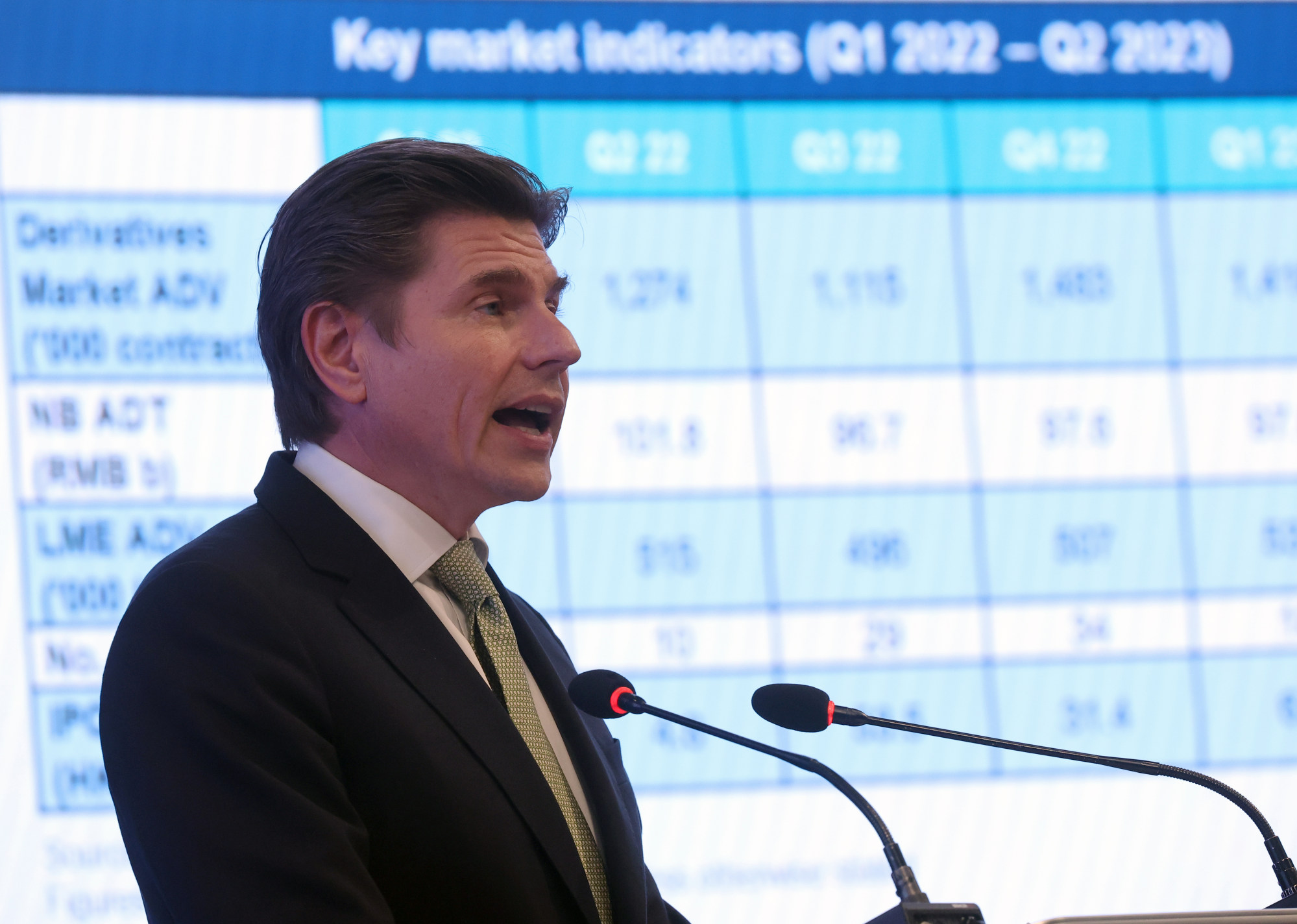
HKEX posts second-best interim period as investments, derivatives trading boost profit to US$809 million
- The Hong Kong stock exchange operator’s net profit in the first half rose 31 per cent year on year to HK$6.31 billion (US$809 million)
- The profit increase was mainly due to a gain in its investment income and higher derivatives trading
“There are a lot of companies that want to choose Hong Kong as a capital raising venue when the market sentiment turns vibrant again,” said Nicolas Aguzin, CEO of the HKEX at a post result briefing on Wednesday.
HKEX on Wednesday reported its second-highest first-half profit, as higher investment income and derivatives trading business offset falling turnover and new listings.
“We are facing a situation where international markets are quite challenging, meaning IPOs internationally have actually decreased by over 30 per cent in the first half,” he said.
Aguzin and HKEX top executives have visited Saudi Arabia three times in the past nine months, and stepped up business trips to several Southeast Asian markets to drum up listing business.
Listing applications have been received from over 110 companies, he said, while many companies have expressed interest to list under the new listing regime introduced in April for specialist technology companies that do not have any income or profit, a mandatory requirement for main board listing.
HKEX’s net profit in the first six months of the year rose 31 per cent year on year to HK$6.31 billion (US$809 million), or HK$4.99 per share, matching analysts’ estimates of HK$6.39 billion compiled by Bloomberg.
The profit fell short of the record half-yearly earnings of HK$6.61 billion in the first half of 2021.
Net profit for the April to June quarter rose 34 per cent year on year to HK$2.91 billion, in line with analysts’ estimates of HK$2.99 billion compiled by Bloomberg. This was lower than the first-quarter profit of HK$3.4 billion, its second-best quarterly profit on record.

Since Aguzin joined the HKEX in 2021, the bourse has introduced a slew of trading products, including MSCI A shares futures and exchange traded funds.
“We love the cash market, which is very good, but we need to continue growing the other sectors,” Aguzin said.
“We create an ecosystem for the derivatives market to work well with the cash market, as well as with ETFs and fixed income.”
HKEX will pay an interim dividend of HK$4.5 per share, 30 per cent higher than a year earlier.
The profit increase was mainly because of a record increase in net investment income to HK$2.68 billion in the first half, 30 times higher than a year earlier. This includes a gain of HK$817 million versus a loss of HK$378 million a year earlier from its portfolio of stocks and bonds, as well as a fourfold jump in interest income to HK$1.86 billion from its margin funds due to higher interest rates.
Aguzin’s diversification strategy has had a positive impact on its bottom line, allowing the bourse operator to achieve decent growth even amid falling turnover and a slow down in initial public offerings.
Despite the average daily transactions on the city’s exchange shrinking by 16 per cent to HK$115 billion during the first half, HKEX’s revenue still rose 18 per cent to HK$10.58 billion.
This was because of a 5 per cent increase in derivatives trading volume to 1.37 million contracts per day during the first half.
The increase in derivatives volume brings in higher trading and settlement fee income, as investors need to put up more margin funds at the exchange. This, together with rising interest rates, boosted investment income from margin funds.
The declining trading volumes led to a 15 per cent drop in trading fees and a 14 per cent drop in settlement fees in the first half. Listing fees shrank by 21 per cent as fundraising from new offerings fell 10 per cent, the HKEX said.
A total of 28 companies raised US$2.2 billion in the first half, Hong Kong’s lowest fundraising total since 2003, according to Refinitiv data.
The two stock connect schemes with mainland China’s bourses contributed HK$1.15 billion in revenue during the first half, 3 per cent lower than a year earlier.
International investors traded 5 per cent more A shares listed in Shenzhen and Shanghai in the first half, amounting to 109 billion yuan (US$14.94 billon). In the southbound direction, volume increased 2 per cent to HK$33.8 billion per day, according to HKEX.
Hong Kong to slash IPO settlement time, boosting city’s appeal for listings
HKEX’s shares dropped 0.7 per cent to close at HK$299.6 on Wednesday, after it announced the result during the lunch break, while the Hang Seng Index’s decline of 1.4 per cent. The stock has fallen about 14 per cent over the past 12 months, while the Hang Seng Index has slipped 7 per cent.
“The HKEX saw better investment income in the first half as a result of higher interest rates and a more stable market,” said Louis Tse Ming-kwong, managing director of Wealthy Securities.
“It is likely to continue to show steady growth in the second half as it has carried out many reforms to diversify its business and also opened offices in New York and London to attract more international listings.”


.jpg?itok=zSWXqQCw)